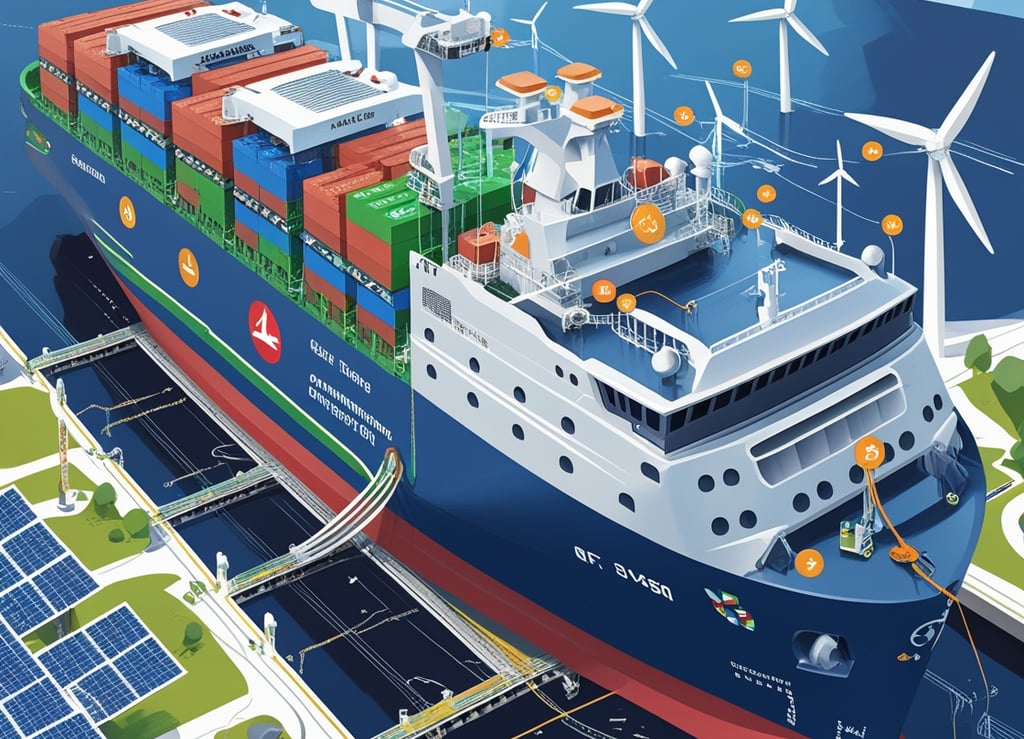
FuelEU Maritime Compliance: A Guide for Shipowners and Charterers
Chintapalli Venkata Balaji
1/15/20253 min read


FuelEUMaritime Compliance: A Guide for Shipowners and Charterers
As the maritime industry intensifies efforts to reduce greenhouse gas (GHG) emissions, the European Union's FuelEU Maritime Regulation stands as a transformative framework set to reshape maritime operations. Scheduled for full implementation on January 1, 2025, this regulation introduces significant changes for ships operating within EU and European Economic Area (EEA) waters. This article explores the implications of FuelEU Maritime for shipowners, charterers, and Document of Compliance (DoC) holders, offering practical compliance strategies and addressing potential legal challenges.
Overview of FuelEU Maritime Regulation
FuelEU Maritime is a cornerstone of the EU's "Fit for 55" legislative package, aimed at reducing net GHG emissions by at least 55% by 2030 compared to 1990 levels and achieving climate neutrality by 2050. The regulation applies to commercial vessels over 5,000 gross tonnage (GT) engaged in cargo or passenger transport to, from, and between EU ports, regardless of their flag state. It mandates progressive limits on the GHG intensity of energy used by ships and promotes renewable and low-carbon fuels. Importantly, it requires compliance on a Well-to-Wake (WtW) basis, encompassing emissions from fuel production to usage.
Globally, FuelEU Maritime aligns with other decarbonization initiatives, including the International Maritime Organization’s (IMO) goals, positioning the EU as a leader in maritime sustainability.
Key Objectives
Reducing GHG intensity: Starting with a 2% reduction in 2025, the regulation targets an 80% reduction by 2050. These limits cover CO2, methane, and nitrous oxide emissions.
Encouraging Alternative Fuels: The regulation promotes renewable and low-carbon fuels and mandates onshore power supply (OPS) during port stays exceeding two hours. OPS will be compulsory at designated ports starting January 1, 2030.
Ensuring monitoring and reporting: Ship-specific Monitoring Plans detailing compliance tracking must be submitted to an accredited verifier by August 31, 2024. Reliable emissions data is essential for adherence.
Challenges for Shipowners
Financial Risks and Contractual Clarity: Defining liability for compliance penalties in contracts is critical. Ambiguities can lead to disputes between shipowners and charterers over financial responsibilities.
High Costs of Alternative Fuels: Transitioning to biofuels, LNG, or hydrogen involves significant investment. Smaller operators face additional challenges due to limited availability and higher costs of alternative fuels.
Complex Compliance Requirements: Monitoring and reporting emissions data accurately is operationally demanding, with errors potentially leading to legal disputes and penalties.
Bureaucratic Navigation: Smaller operators may struggle with the administrative burden of compliance, highlighting the importance of informed contract management.
Pooling Mechanisms: Sharing compliance credits among vessels through pooling can mitigate risks but requires careful negotiation among stakeholders.
Legal Implications for Shipowners
Primary Responsibility: DoC holders bear the primary responsibility for meeting GHG intensity limits. Shipowners may face penalties even if non-compliance results from charterers’ operational decisions.
Financial Liability: Penalties for non-compliance can impose substantial financial burdens on shipowners if charterers fail to meet their obligations.
Expulsion Orders: Non-compliance may result in expulsion orders from ports, disrupting operations and causing financial losses.
Contractual Disputes: Undefined responsibilities in contracts can lead to disagreements between shipowners and charterers over liability for penalties.
Robust Contract Clauses: Specific clauses, such as the BIMCO FuelEU Maritime Clause for Time Charter Parties, can clarify responsibilities and allocate liabilities, reducing risks.
Data-Driven Strategies for DoC Holders
To ensure effective compliance, DoC holders should adopt data-driven strategies tailored to their operations:
Evaluate Proposals Holistically: Conduct a thorough analysis of charter proposals to avoid one-sided agreements that could expose DoC holders to unforeseen liabilities.
Implement Compliance Tools: Use advanced tools to monitor emissions data, assess fuel options, and simulate operational scenarios. This approach facilitates informed decision-making.
Adopt strategic decision-making: A data-driven strategy enables cost-effective compliance, distinguishing between financial strain and operational efficiency.
Onshore Power Supply (OPS) Requirements
Starting January 1, 2030, passenger and container ships must use OPS during berth stays at designated ports under Article 9 of the Alternative Fuels Infrastructure Regulation (AFIR). From January 1, 2035, OPS requirements will extend to all EU ports with developed capacity. This mandate necessitates substantial investment in both port infrastructure and vessel retrofitting.
Conclusion
The implementation of FuelEU Maritime marks a critical juncture in the maritime industry’s decarbonization journey. By adopting proactive strategies, stakeholders can address compliance challenges while minimizing legal and financial risks. Clear contractual arrangements, robust monitoring systems, and strategic investments will enable shipowners, charterers, and DoC holders to thrive under this evolving regulatory framework.
With FuelEU Maritime now in force as of January 1, 2025, engaging in collaborative discussions and leveraging industry best practices is more critical than ever. Compliance with the regulation not only supports global sustainability goals but also positions stakeholders to achieve operational excellence in a greener maritime future.